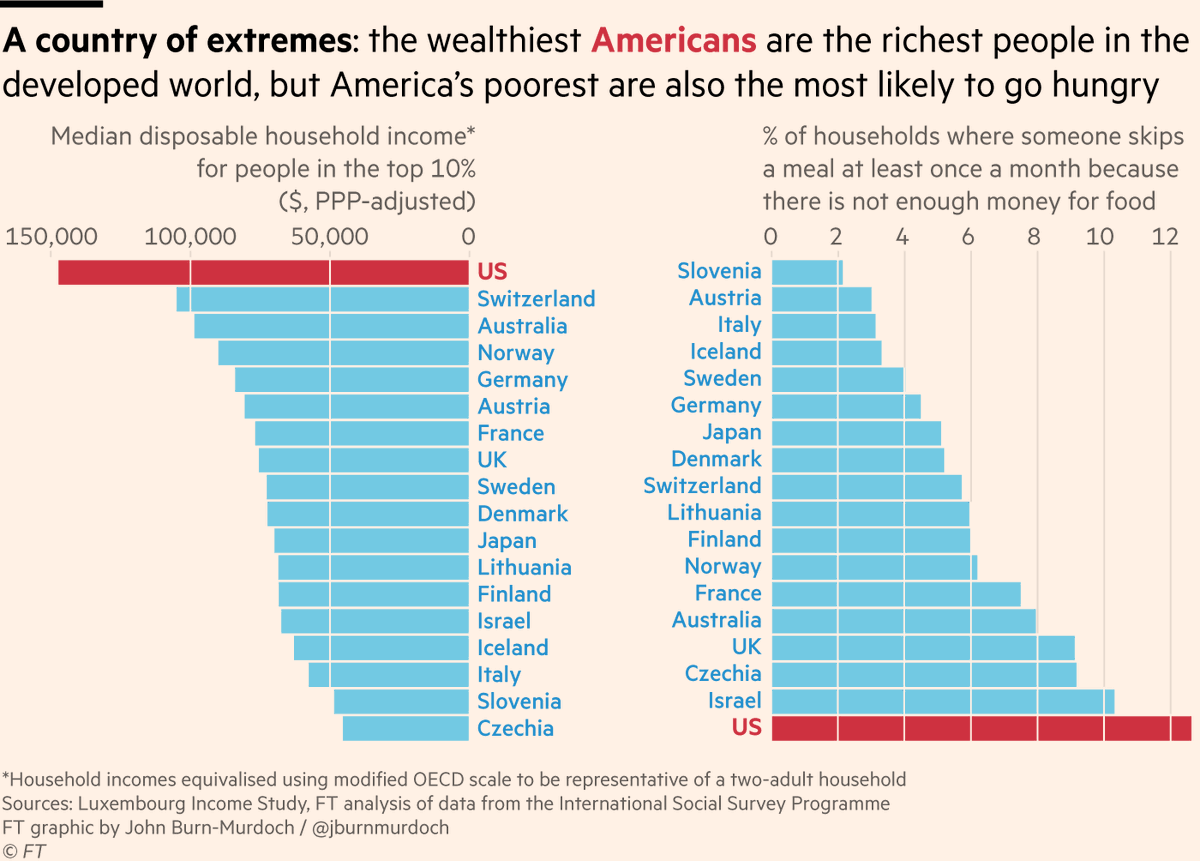NEW: Does the American Dream foster inequality?
Let’s start with a shocking stat:
These two things are simultaneously true:
• The richest Americans are the richest in the world
• Food poverty is more severe in America than in any other developed country
Let’s start with a shocking stat:
These two things are simultaneously true:
• The richest Americans are the richest in the world
• Food poverty is more severe in America than in any other developed country

To reiterate, a higher percentage of people in America have to skip meals because they don’t have enough money for food, than in not only Britain & France but also Lithuania & Slovenia.
By this measure, extreme poverty is worse in the US than in any of these poorer countries.
By this measure, extreme poverty is worse in the US than in any of these poorer countries.

But despite such wide disparities in US living standards, a fascinating new study finds that:
• Americans are less supportive of efforts to redistribute income from rich to poor than people in peer countries
• After reading about inequality in the US they become even less keen!
• Americans are less supportive of efforts to redistribute income from rich to poor than people in peer countries
• After reading about inequality in the US they become even less keen!

Why?
Could it be that Americans still don’t appreciate the severity of US inequality?
It doesn’t look like it: Americans are more likely to describe their country’s income distribution as "very unfair" than people in any other peer country
Could it be that Americans still don’t appreciate the severity of US inequality?
It doesn’t look like it: Americans are more likely to describe their country’s income distribution as "very unfair" than people in any other peer country

But: Americans are by far the least likely to say government should try to narrow the gap between rich and poor, and the most likely to say it’s up to low-income people themselves.
The old "pull yourself up by your bootstraps" philosophy
The old "pull yourself up by your bootstraps" philosophy

As it happens, Americans are also the most likely to say that despite the gap between rich and poor being so large, nothing should be done about it 🤷♂️
"Yes some people are very rich and some people are very poor, that’s life", essentially.
"Yes some people are very rich and some people are very poor, that’s life", essentially.

And this brings us onto the American dream aspect: more than any other country Americans believe firmly that hard work brings success… 

And Americans view themselves as more upwardly mobile than people from other countries, feeling that they will move up the ranks of society in the coming years.
Between this and the "hard work brings success" chart, this is the American Dream distilled in two graphics.
Between this and the "hard work brings success" chart, this is the American Dream distilled in two graphics.

But that’s just perceptions. How about reality?
The US actually has one of the *lowest* rates of social mobility of any developed country.
Both upward mobility and the idea that hard work translates into success are *less true in the US than almost anywhere else*
The US actually has one of the *lowest* rates of social mobility of any developed country.
Both upward mobility and the idea that hard work translates into success are *less true in the US than almost anywhere else*

So, a strong culture of aspiration, meritocracy and individual responsibility. Many would argue these all are positives, and I wouldn’t even disagree.
Britain could certainly do with more aspiration!
Britain could certainly do with more aspiration!
And these beliefs surely all play a role in America’s entrepreneurialism and wealth generation.
The US as a whole is very rich. It’s full of innovators, and attracts the best from around the world.
The US as a whole is very rich. It’s full of innovators, and attracts the best from around the world.
But these strong beliefs in individual responsibility and the accompanying scepticism of government intervention make it easier for inequalities to arise, and much harder to address them.
Americans recognise that inequality is a problem, but consistently reject the solutions.
• Higher taxes on the rich? No thanks.
• Increase the minimum wage? Nah.
• "Inequality is not government’s problem, it’s individuals’ problem"
• Higher taxes on the rich? No thanks.
• Increase the minimum wage? Nah.
• "Inequality is not government’s problem, it’s individuals’ problem"

Now, does all of this mean extreme wealth and extreme poverty have to go hand in hand?
I don’t think so. You can have a society where the rich do very well and the poor still have a good standard of living.
But America is clearly not currently getting that balance right:
I don’t think so. You can have a society where the rich do very well and the poor still have a good standard of living.
But America is clearly not currently getting that balance right:

In US society, a culture of aspiration and individual responsibility appears to breed apathy towards inequality and especially towards government intervention, leaving the poorest to fend for themselves.
Here’s my column in full: ft.com/content/6a6175…
Here’s my column in full: ft.com/content/6a6175…
And here’s the ingenious study from @PepperCulpepper and co that found that Americans become *even less supportive of redistribution* after reading about US inequality banklash.bsg.ox.ac.uk/sitefiles/rigg…
• • •
Missing some Tweet in this thread? You can try to
force a refresh















